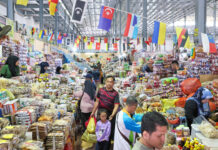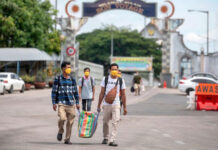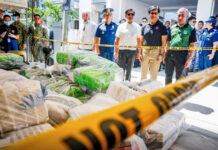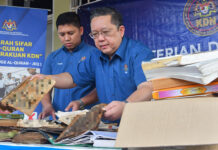JAKARTA (ANN/THE STRAITS TIMES) – Indonesia’s newly sworn-in president, Prabowo Subianto, unveiled a record-breaking Cabinet, the largest in the nation’s history on October 20.
The 48-member team, announced on his first day in office, underscores Prabowo’s commitment to maintaining policy continuity and ensuring political stability.
The diverse line-up blends seasoned politicians, industry professionals, and business executives, with notable appointments including figures closely connected to key business backers who supported Prabowo’s election campaign.
The ministers were chosen from six of the eight national political parties, as well as through recommendations by former president Joko Widodo and prominent Islamic organisations.
Mr Prabowo also named five other high-ranking, minister-level officers: attorney-general, head of intelligence unit, head of presidential staff, head of presidential communication office and Cabinet secretary.
This approach is expected to boost the administration’s legitimacy and reduce potential tensions among political elites, said Mr Rudy Syamsuddin, a former chairman of a housing material producers’ association in Indonesia.
“Such broad representation, however, could slow down decision-making due to the need to balance competing interests,” Mr Rudy told the source.
He said Mr Prabowo will likely reshuffle the Cabinet once he has gained enough political momentum some time in 2025. “It is important to keep everyone happy for now, during the transition.”
Noted political analyst Burhanuddin Muhtadi told Jakarta-based KompasTV: “With the large Cabinet size, the decision-making process would be more complicated and would not be efficient.”
Mr Prabowo has been huddled for weeks with his close aides and key donors such as tycoon Andi Syamsuddin Arsyad to shortlist names for his Cabinet team.
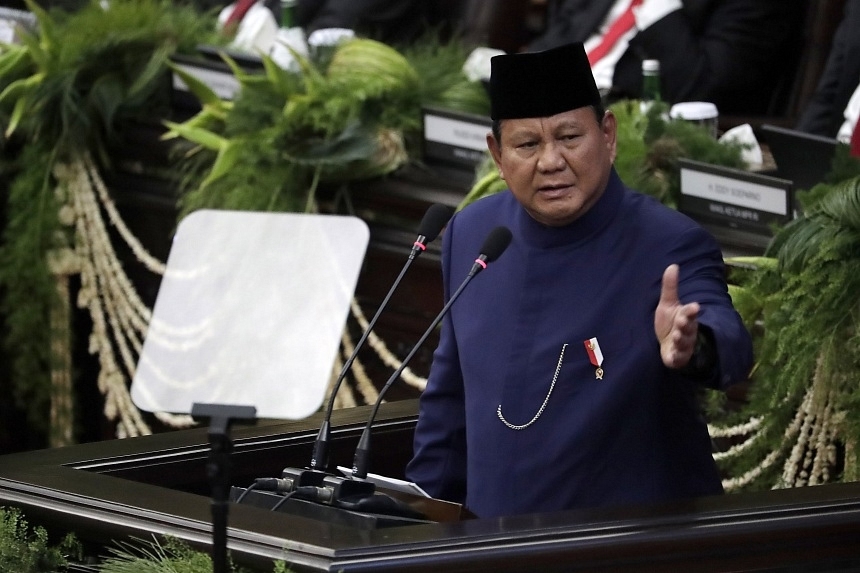
The appointees will be sworn into their posts on October 21.
The last time Indonesia had a Cabinet of more than 40 ministers was from 1993 to 1998, in the last term of former president Suharto. The law on ministry affairs in 2008 capped the number of ministers at 34, but this was scrapped in May.
The Cabinet of Mr Prabowo’s predecessor, Mr Widodo, had 34 ministers.
In his inaugural speech on October 20, Mr Prabowo said it is important to ensure the nation’s resources are used for the welfare of the entire Indonesian population, and this goal can be achieved only if all leaders and political elites unite and work together.
“Let’s consider anyone who is from different political parties and groups as fellow countrymen. We compete, and when the competition is over, we are no longer rivals,” said Mr Prabowo, adding that after he lost to Mr Widodo in the previous election in 2019, Mr Widodo asked him to join the Cabinet, and he accepted the offer.
“Now, I won the election, and I am inviting all parties to unite and work together.”
The new Cabinet line-up consists of seven coordinating ministers or senior ministers, and 41 ministers. The chairmen of three political parties were appointed as coordinating ministers.
Finance Minister Sri Mulyani Indrawati will remain in the position that she took up in 2016, a move that will be lauded by financial markets. She also served in the same post from 2005 to 2010.
State-Owned Enterprises Minister Erick Thohir, whose family was a main campaign donor to Mr Widodo, will continue in the same role too.
Other ministers from the Widodo administration who will continue in their roles include Energy and Mineral Resources Minister Bahlil Lahadalia, Investment Minister Rosan Roeslani, and Industry Minister Agus Gumiwang Kartasasmita.
The trio will be chiefly in charge of boosting the country’s industrial development, among other areas, by leveraging its mineral wealth, which is crucial to the electric vehicle industry.
The key post of foreign minister will be held by Mr Sugiono, who like many Indonesians uses one name. He is a military officer-turned-politician who helped Mr Prabowo establish the Gerindra party.
He studied in the 1990s at Norwich University’s military academy in Vermont, which is the oldest private and senior military college in the US.
Another key post – coordinating minister for political and security affairs – will be held by former head of Indonesia’s intelligence unit Budi Gunawan, a former police general.
Mr Prabowo’s presidential ticket at the February 14 election was backed by four national parties: his own Gerindra, Golkar, the National Mandate Party (PAN) and the Democratic Party.
Three others – the NasDem Party, Prosperous Justice Party and National Awakening Party (PKB) – which backed a rival presidential candidate, joined the ruling coalition after Mr Prabowo was declared the winner.
The Indonesian Democratic Party of Struggle has not declared its support for the Prabowo administration, while NasDem pledged its support but refrained from proposing any names to Mr Prabowo for selection as Cabinet ministers.
The three chiefs of political parties who have been appointed coordinating ministers are: Democratic Party chairman Agus Harimurti Yudhoyono (infrastructure affairs), PAN chairman Zulkifli Hasan (food affairs) and PKB chairman Muhaimin Iskandar (people’s welfare). Mr Agus is the elder son of former president Susilo Bambang Yudhoyono.
Mr Widodo’s close aide and former state secretary Pratikno, who also goes by one name, was appointed the coordinating minister for human development and cultural affairs. Another close aide, Mr Budi Arie Setiadi, was appointed the small business and cooperatives minister. He was formerly the communication and information minister.
Indonesia’s two largest Islamic organisations, Nahdlatul Ulama (NU) and Muhammadiyah, have several top cadres appointed to the Cabinet.
The NU cadres are reappointed Social Affairs Minister Saifullah Yusuf and newly appointed women’s empowerment and child protection minister Arifatul Choiri Fauzi. Muhammadiyah’s Mr Abdul Mu’ti is the new primary and secondary education minister.






